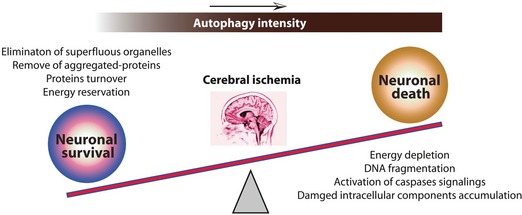Figure 1.

A balance between autophagy‐regulated neuronal death and survival in cerebral ischemic stress. Upon cerebral ischemic stress, basal autophagy in neuronal cells acts as a cytoprotective mechanism and serves homeostatic functions such as superfluous organelles removal, aggregated‐proteins turnover/elimination and energy reservation to provide metabolic substrates for survival. However, the long‐term, uncontrolled and strong, autophagy can digest vital amounts of cell components and survival factors, thus leading to the energy depletion, DNA fragmentation and activation of apoptotic/necrotic signaling pathways, and thereby cell death.
